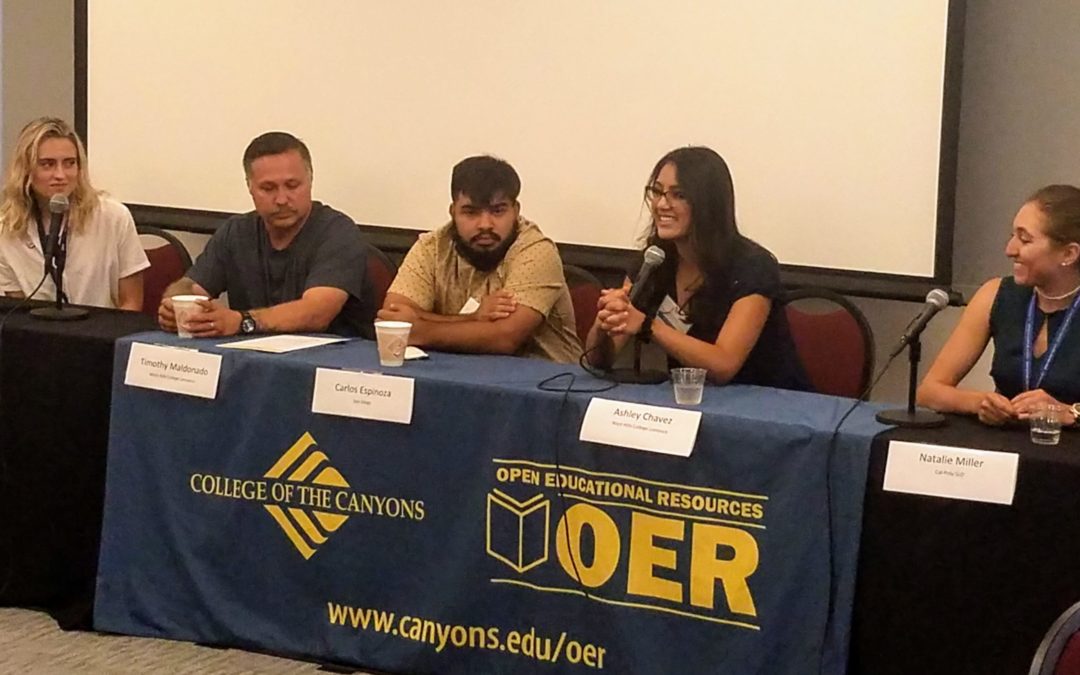Last week the Michelson 20MM Foundation was able to attend the Zero-Textbook Cost (ZTC) Degree summit hosted by College of the Canyons and The Community College Consortium for Open Educational Resources (CCCOER). Hundreds of ZTC and OER advocates gathered to learn about the impact of these movements within California.
ZTC Degree program was created in 2016-17 to reduce the overall cost of education for students and decrease the time it takes students to complete degree programs offered by community colleges. “ZTC Degrees” are associates degrees or career technical education certificates comprised entirely of courses that eliminate all additional textbook and material fees through the use of high quality, no-cost learning content with an emphasis on OER. The program funded twenty-three community colleges across California to develop thirty-three ZTC Degrees or Career Technical Education certificates over a two-year period.
The morning keynote was from SPARC’s Director of Open Education Nicole Allen who spoke about how OER benefits go well beyond affordability. OER can actually make education better and not just more affordable. OER can assist with making higher education a more equitable learning environment by ensuring all learners have access to their educational materials on or before their first day of classes. Nicole also reminded the audience with the textbook publishers shifting to inclusive access (automatic billing) and digital first models bring huge concerns around student data and privacy.
A highlight of the summit was a presentation by the Student OER Advocate. These group of students, funded by the Michelson 20MM Foundation, spoke about the incredible work they are doing to create a toolkit for students to lobby faculty and administration to make the switch to OER. The finished product will be released by January and will serve as a great resource for California State University and California Community College students as they inform faculty on the benefits of switching to OER. The session, facilitated by Michelson OER Fellow Dr. Barbara Illowsky, also reviewed how a project like this, that involves 8 students at campuses throughout the state, can be executed and the various challenges that may entail.
Following our Student Advocate grantees, representatives from the ZTC Degree programs at Santa Ana College, San Bernardino Valley College, Reedley College, Skyline College, College of Canyon, West Hills College Lemoore, and College of Alameda spoke about the highlights the program has had at their campuses. One example of these highlights is the $1.3 million in estimated students savings due to the implementation of 1 ZTC Degree at Skyline College.
The jam packed day included a presentation by CSU-Channel Islands of their own ZTC Degrees which they call Z-Degrees. These degrees are the first of their kind in the Cal State system. The afternoon consisted of breakout sessions on a variety of different topics including ZTC outcomes data gathering, open pedagogy, sustainability of ZTC Degrees, and engaging students in OER. The day ended with a closing keynote from Hal Plotkin, former Senior Policy Advisor in the U.S. Department of Education, around the power and future of ZTC Degrees.
Overall, attendees left the conference energized about the benefits for students and institutions offered by the ZTC Degree program. These advocates will continue to work on the ground at their schools to further these efforts to decrease costs for students and increase equitable solutions. The ground is fertile for additional investments in the ZTC Degree program.
